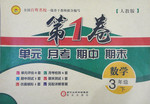题目内容
We must believe in ourselves,_______, I think, is the most important in our life.
| A.where | B.what | C.which | D.that |
C
解析

 第1卷单元月考期中期末系列答案
第1卷单元月考期中期末系列答案It was the beginning of  the school year a few years ago and I had a little boy in my class who came from a non-English speaking home. He was very quiet and shy. I wasn’t sure how much he understood during the school day and I was especially concerned that he just stood by himself at break time and did not play. If I tried to talk to him, he would turn away and tightly shut his eyes to hide from me.
the school year a few years ago and I had a little boy in my class who came from a non-English speaking home. He was very quiet and shy. I wasn’t sure how much he understood during the school day and I was especially concerned that he just stood by himself at break time and did not play. If I tried to talk to him, he would turn away and tightly shut his eyes to hide from me.
After a day or two of this, I decided to seek the help of one of my outgoing and friendly little girls. I called her over and she ran to me, ready to help.
I immediately began a long speech about what I needed from her. I asked her if she would try to get him to play, and I started talking quickly about all these suggestions on how she could start communicating with him. I explained she could do this, she could do that, she could try this idea, she could try that idea. She touched my arm to stop my talking and looked up at me in that wise and special way that only a six-year-old can, and said, “Don’t worry. I speak kid.” And she ran off.
I stood there all alone, silently watching her. It took less than a minute for the two new friends to run off, hand in hand, happily joining a game of tag(捉人游戏) taking place all over the gym.
hand in hand, happily joining a game of tag(捉人游戏) taking place all over the gym.
I often think of that small moment, about what I learned and how important it is for all teachers to speak kid—big kid, little kid and middle kid. I knew my focus must be on teaching students how to think, how to approach problems, and how to figure out solutions and never take the opportunity away. We must be ready to learn from our students because those “teachable moments” during the school days are for us, the teachers, as well as our kids.
【小题1】.
Why did the author worry about the boy?
| A.He didn’t dare to look the author in the eye. |
| B.He couldn’t speak English as well as other students. |
| C.He failed to understand what the author taught. |
| D.He was unwilling to communicate with others. |
After the girl agreed to help, the author .
| A.taught her what to do in detail | B.thanked her for her willingness to help |
| C.sent her to make friends with the boy at once | |
| D.reminded her of what she should be careful about |
By saying “I speak kid”, the girl meant that she could .
| A.speak the language that kids understand | B.speak the boy’s native language |
| C.understand what kids are thinking | D.speak well like a little kid |
The underlined words “the opportunity” refer to the chance to .
| A.play at break time | B.learn from students |
| C.solve problems | D.speak kid |
 ered from a serious disease. Luckily he has r_____ now.
ered from a serious disease. Luckily he has r_____ now. is _____ (流利的)
is _____ (流利的)  spoken English.
spoken English.